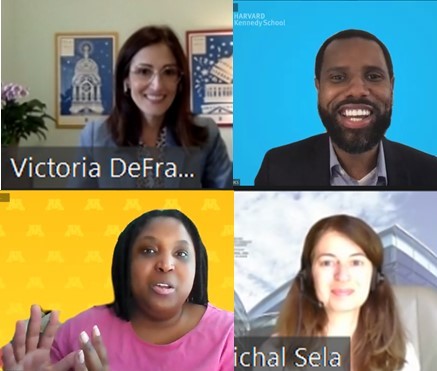APSIA Welcomes New Advisors through Diversity Forum Workshop
From May 17-21, 2021, APSIA hosted the fifth annual Diversity Forum Workshop for Advisors. More than 40 advisors from 37 institutions attended.
Recordings from the week can be found on APSIA’s YouTube page.
Created in 2017, the Diversity Forum seeks to inspire students and young professionals – and those who counsel them – to seek out careers in international affairs. The series particularly focuses on students who are traditionally underrepresented in the field.Advisors from across the United States registered for the 2021 workshops, including those from Alabama State, Alcorn State, Arkansas State, Bethune-Cookman, CSU Channel Islands, Coppin State, Edward Waters College, Florida A&M, Jackson State, Lehman College, Mesa Community College, Mississippi Valley State, Morgan State, Navajo Technical University, New Mexico State, North Carolina A&T, Saint Paul College, San Diego State, Savannah State, Siena College, Southern Methodist, Universidad del Sagrado Corazón (PR), University of Alaska Southeast, University of Arizona, UC Davis, UC Santa Barbara, University of Central Florida, University of Texas, Austin, University of Texas, San Antonio, University of the Virgin Islands, Valencia College, Western New Mexico University, and Winston-Salem State. On Monday, May 17, Reesha Patel, an Associate with McLarty Associates, moderated the advisors’ introduction to careers in international affairs. Attendees heard from alumni Amy Donhauser, Senior Program Manager at We Care Solar, Alden Hartopo, Senior Associate in the McLarty Associates’ Asia Practice, Sid Ravishankar, Staff Director for the US House Committee on Foreign Affairs, and Evania Robles, a Program Analyst in the US Agency for International Development Bureau for Resilience and Food Security.Speakers emphasized the need for effective communication skills, especially “brief, direct writing.” They encouraged advisors to build up students’ research, teamwork, and leadership experience. Students need to be comfortable building relationships (networking). Alumni also suggested ways to build critical skills, such as virtual internships, on-campus organizations, free online courses, or doing research with a professor. Students should worry less about what they think employers want to see. “Any experience that can be translated to meet skills sought by employers,” they said. On Tuesday, May 18, Ariel Matos, Associate Director of Graduate Admissions with Princeton University School of Public and International Affairs, alumnus Zach Przystup, Senior Program Officer for the Fulbright Program with the US Department of State, and Sara Dushey Toubiana, Senior Global Recruitment Partner at the Open Society Foundations, talked about ways to challenge the narrative of what ‘counts’ in applications and ways to empower students to tell their stories.Moderated by alumnus and US Foreign Service Officer Calvin Hayes, the session stressed how important it is for students to tell their distinct story. This narrative emphasis does not need to dwell on struggles. Instead, advisors should help students share what they learned, how they grew, and how they displayed tenacity, resilience, adaptability, or grit from those experiences. These are key traits. A position in the service sector, caring for family, being a first-generation student, etc. – all of these opportunities link to what employers, graduate schools, and fellowship programs want to see. On Wednesday, May 19, advisors gained insights into the graduate school admissions process from Sherlonda Clarke, Director of Recruitment and Admissions at the University of Minnesota Hubert H. Humphrey School of Public Affairs, Michal Sala, Deputy Head of Student Services at the Graduate Institute of Geneva, and Oliver Street III, Assistant Dean for Enrollment Services, Harvard Kennedy School. Victoria M. DeFrancesco Soto, Assistant Dean for Civic Engagement at the University of Texas at Austin LBJ School of Public Affairs, moderated the session.Schools want curious students who are out to change the world. Students should consider graduate school if it meets a personal goal to deepen one’s expertise or a professional goal to advance in one’s career. Schools really do look at applications holistically, so students should approach all of the pieces to an application in the same way. “It’s not a set of hurdles to clear,” speakers said, but a chance to talk through your journey and how graduate school fits into the next phase.Graduate school in international affairs and policy enables students to understand the intersection of various problems and learn how to make a positive change on the local, national, and global levels. “Every aspect of daily life is governed by these areas, what better way to understand and address problems affecting our world than by pursuing a career in this field?” On Wednesday, Monique Posadas, McNair Scholars Program Assistant Director for the California State University Fullerton, also moderated an open conversation to share best practices about ways to bring public and international affairs to campus. Advisors shared questions they frequently face from students and offered some resources and program ideas to address them. Manuel DeLeon, Assistant Professor in Political Science and International Studies at Bethune Cookman University, moderated a session among Bunmi Akkinsoutu, Deputy Director of the Charles B Rangel International Affairs Program, Regan Kwan, Research Associate at The Stimson Center, and Beth Soboleski, Director of Student Recruiting and Admissions for the University of Michigan Ford School of Public Policy to explore ways for help students afford graduate school and critical experiences.The candid conversation touched on some of the barriers to engaging students in international affairs, the role of parents in influencing students’ choices, and the need for more visibility of the field and in the field. Speakers listed numerous programs and opportunities in which students can participate to make experiences affordable or bring speakers to campus to share their stories. Finally, on May 21, APSIA’s Carmen Iezzi Mezzera and Briana Suarez offered an introduction to the ways in which APSIA can help advisors support their students. They introduced the tools on the APSIA and PISA Websites and offered their support to advisors going forward.

